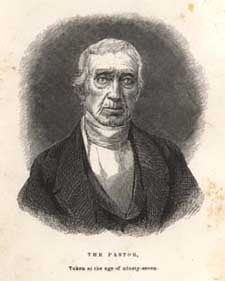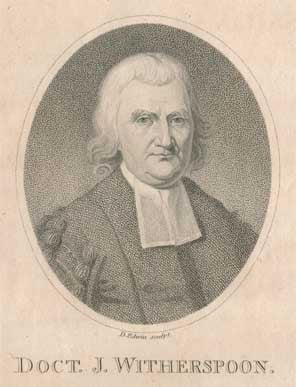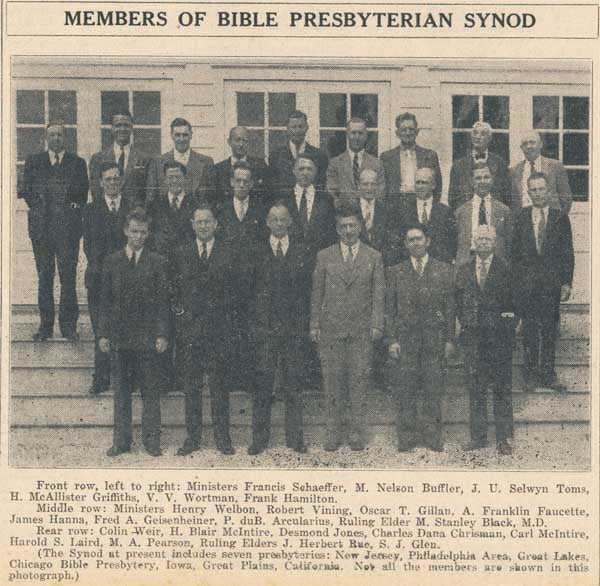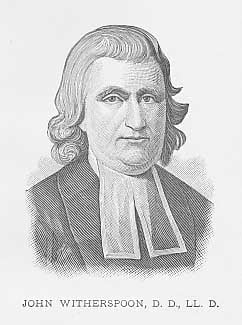The bicentennial observation of the founding of the Fairfield Presbyterian Church, of Fairton, New Jersey, commonly known as the Old Stone Church, was observed on September 29, 1880, the church having been organized in 1680. That congregation continues on to the present day and is a member church of the Presbyterian Church in America.
 Easily the most distinguished pastor in the history of the Old Stone Church was the Rev. Ethan Osborn.
Easily the most distinguished pastor in the history of the Old Stone Church was the Rev. Ethan Osborn.
For our Lord’s day sermon, the following is a transcript of the aged pastor’s last words to his congregation,
“the aged preacher, in all the faithfulness of his still loving heart, and under circumstances which could not fail to awaken for him the sympathy of his audience. He is now in his ninety-second year. The place where he stands was he scene of his eventful ministrations for more than half a century, and he does not expect ever to preach from that pulpit again. After referring to the ministry of his predecessor, who in 1780 preached the first sermon in the house, to his own labors there, and to those of the writer of this memorial, then the pastor of the congregation, he proceeds—”
“I may safely say that by the preaching of these three ministers, in this house, the doctrines and all things essential to duty and salvation, have been clearly explained and faithfully urged upon the people. The doctrine of human depravity has been explained and proved from Scripture and common observation. Here also the doctrine of regeneration has been repeatedly set forth, and the absolute necessity of it urged upon the people. It has been shown that we must be new created in Christ Jesus, must have the love of God ruling in our hearts, or we can never be admitted into his kingdom.
“Also the doctrines of repentance toward God and faith in the Lord Jesus Christ, have been faithfully preached in this house, and their absolute necessity in order to obtain pardon and heavenly felicity. Likewise the duties prescribed in the gospel have been explained and insisted on. The people have been informed that supreme love to God is their indispensable duty. Here also they have been taught the duties we owe, one to another, to do good to all according to our abilities and opportunities; and to ourselves, to live sober and religious lives in the world. Here also, that the law forbids every sin, whether in action, word or heart, and pronounces a curse on every transgression of it. For ‘cursed is every one that continueth not in all the things which are written in the book of the law to do them.’ And as all have sinned, therefore no human being can be justified before God by the deeds of the law, or by meritorious obedience. The law requires perfect and perpetual obedience. But as no man has yielded such obedience, or possessed sinless perfection, therefore in vain do you now look to the law for justification.
‘Since to convince and to condemn,
Is all the law can do.’
“But, thanks to God : the gospel reveals a way of justification, how we may obtain forgiveness and the favor of God. And this blessed gospel has often been preached in this house, the gospel which offers a free pardon to every humble penitent. ‘This is a faithful saying and worthy of all acceptation, that Christ Jesus came into the world to save sinners.’ The blessed Saviour invites the weary and heavy laden sinner to come to him, assuring him that he will raise him up at the last day to eternal life. Such is the inviting and beneficent language of the gospel. But at the same time, both law and gospel denounce everlasting punishment on such as reject the Saviour and die impenitent.
“Now the interesting question is, How have the people improved the preaching of the law and the gospel? Most of those who lived under the ministry of my predecessor have gone to the grave. But to you who are yet living and hearing the gospel, the question is solemn and important. Have you so improved the preaching of God’s word as to become wise unto salvation through faith in Christ Jesus?
“To those who are pious believers, I would say, you have chosen the good part, and God has begun a gracious work in you which he will carry on until it terminates in glory. So that by faith in Christ, shaving laid hold on the hope set before us, you may have a strong consolation, and go on your Christian course rejoicing. Be not satisfied with your present relative attainments, but press forward to the work of perfection, the prize of the high calling of God in Christ Jesus. Use the appointed means of reading and hearing the word of God, not forsaking the assembling of yourselves for public worship, as many do, and by no means neglect the privilege and duty of prayer. Ask and receive, not only that you may have grace to serve God, but that you may also grow in grace and in the knowledge of your Lord Jesus Christ. In this way religion will become more pleasant. The nearer you advance toward heavenly perfection, the more delighted you will be with heavenly enjoyment. ‘O taste and see that the Lord is good.’
‘Come leave his pleasant ways,
And let us taste his grace.’
“Never be weary in well doing, for in perseverance, you shall in due time reap a glorious harvest. As an inducement thus to live and spend your remaining days, remember your judge and mind will ere long call us to answer, how I have preached the gospel and how you have improved it.
“I now turn to those of you whose future happiness is not yet secured by faith in the Mediator. Your situation is awfully dangerous. You are now suspended between the possibility of eternal happiness or eternal misery. You are now between the two vast extremes, or if I may more plainly express it between heaven and hell. Either celestial happiness or infernal misery must in a short time be your everlasting portion. How solemn is the prospect before you—the joys of heaven or the sorrows of hell, one of which must be your everlasting portion,—the latter except ye turn at God’s reproof. ‘As though God did beseech you, by us, we pray you, in Christ’s stead, be ye reconciled to God.’ Believe me when I say it is my heart’s desire and prayer to God, that you and I may have a joyful meeting at the judgment, in the presence of our Lord Jesus Christ.
“As we expect this to be the last Sabbath on which I shall speak to you from this pulpit, let me say, in the presence of God who knows my heart, that I have endeavored and prayed that I might faithfully perform my ministerial duties. Though I am conscious of much imperfection, God is my witness, that I have ever preached such doctrine and precepts as I verily believe are agreeable to his word. I have repeatedly said, ‘the lines are fallen unto me in pleasant places; yea, I have a goodly heritage.’ With gratitude to God, I look back upon the religious revivals with which he has blessed us and the friendly relations which have subsisted between us. It is no small satisfaction that as pastor and people we separated as friends, and that a pleasant intercourse subsists between myself and my successor, your present pastor. Never were the people more dear to me, I shall love them as long as I live.
“Excuse my plainness, and permit me once more to say in the fullness of my feelings, that my heart’s desire and prayer to God for you all is, that you may be saved. As it will not be long before we must each answer to God—I for my ministry, and you for your improvement of it, let us be diligent in what duty remains and in advancing toward heaven. Let brotherly love continue and abound, until it shall be perfected in the heavenly kingdom. And may God prepare us all to meet in heaven! I now bid you a cordial farewell, praying that it may fare well with you in this world, in blessings of health and prosperity, as far as shall be for God’s glory and your own good, and that in the future world, entered with your blessed Saviour into the joy of your Lord, you may FARE WELL.”
[excerpted from The Pastor of the Old Stone Church (1858), pp. 52-56. To read this work online, click here.]





